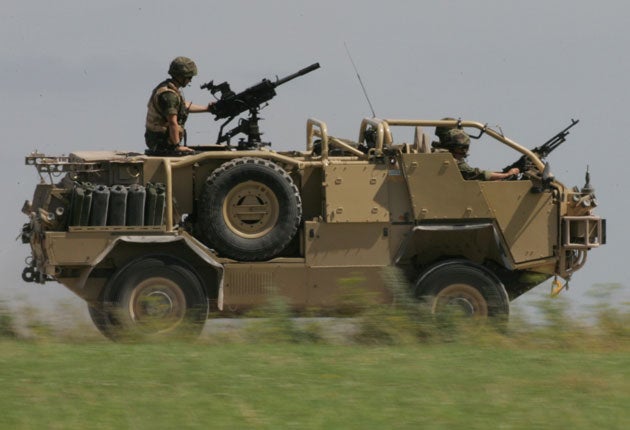Taliban kills three in attack on British patrol
Fourth paratrooper fights for life as Special Forces Support Group reels from its biggest single loss of life

Your support helps us to tell the story
From reproductive rights to climate change to Big Tech, The Independent is on the ground when the story is developing. Whether it's investigating the financials of Elon Musk's pro-Trump PAC or producing our latest documentary, 'The A Word', which shines a light on the American women fighting for reproductive rights, we know how important it is to parse out the facts from the messaging.
At such a critical moment in US history, we need reporters on the ground. Your donation allows us to keep sending journalists to speak to both sides of the story.
The Independent is trusted by Americans across the entire political spectrum. And unlike many other quality news outlets, we choose not to lock Americans out of our reporting and analysis with paywalls. We believe quality journalism should be available to everyone, paid for by those who can afford it.
Your support makes all the difference.Three special forces paratroopers have been killed in Afghanistan and another is critically ill after their vehicle was hit by a bomb.
The soldiers are from 1st Battalion, The Parachute Regiment, which forms the backbone of the new Special Forces Support Group (SFSG). The deaths make yesterday the bloodiest day in the unit’s three-year history.
The news comes after the deadliest month for British forces in Helmand – 22 British personnel were killed in July, largely due to an ambitious five week operation to clear the Taliban from an area north of Lashkar Gah that is the size of the Isle of Wight.
On Thursday, the SFSG soldiers were supporting an Afghan security forces patrol in the area when their Jackal armoured vehicle was hit by a bomb, killing the three soldiers instantly. The group then came undersmall arms fire which they fought off so they could transport the fourth injured soldier back toCamp Bastion.
Last night, the Ministry of Defence confirmed that the families of all four men had been informed. The deaths come 10 days after the Prime Minister, Gordon Brown, declared Operation Panchai Palang (Panther’s Claw) a victory, stating that an area home to 80,000 people had been captured. The operation has been one of the biggest that British forces have undertaken in Afghanistan. Thursday’s patrol had been part of the wider Operation Chasmi Palang (Panther’s Eye).
Troops were holding the ground and operating alongside the Afghan army and police to reassure locals before this month’s election. Roadside bombs remain a threat to soldiers – 1,000 were uncovered in three months earlier this year.
The British death toll in Afghanistan has now reached 195; 58 soldiers have been killed so far this year, compared with 51 in the whole of 2008. Along with Royal Marines and RAF personnel, 1 Para formed the SFSG in April 2006 to add strength and fire power to British Special Forces missions and provide extra counter-terrorist capability. Brigadier-General Eric Tremblay, from theNato led International Security Assistance Force, said the force was saddened by the deaths of the soldiers. “Our forces risk their lives every day to help eliminate Taliban oppression in Afghanistan,” he said. “The insurgents have so many times proven to be ruthless to Afghans who dare not to co-operate with them or refuse to turn a blind eye to their criminal and brutal activities.”
News of the latest deaths came as the new Nato secretary-general, Anders Fogh Rasmussen, said that more troops were needed if the mission in Afghanistan was to succeed. “I think we need more troops. I have seen progress in the south, not least thanks to the increase in the number of troops. So definitely the number of troops matters,” he said. “However, we also have to realise that there is no military solution solely. We have to provide the Afghan people with better life opportunities as well if we are to win hearts and minds.”
*The man who will soon take over as the head of the Army has said that British involvement in Afghanisation could last up to 40 years. General Sir David Richards, who will become Chief of the General Staff later this month, told a national newspaper: “I believe that the UK will be committed to Afghanistan in some manner - development, governance, security sector reform – for the next 30 to 40 years.” He said, however, that troop involvement should be needed only in the medium term, and that the focus now should be on the expansion of the Afghan National Army and Afghan National Police.
Join our commenting forum
Join thought-provoking conversations, follow other Independent readers and see their replies
Comments